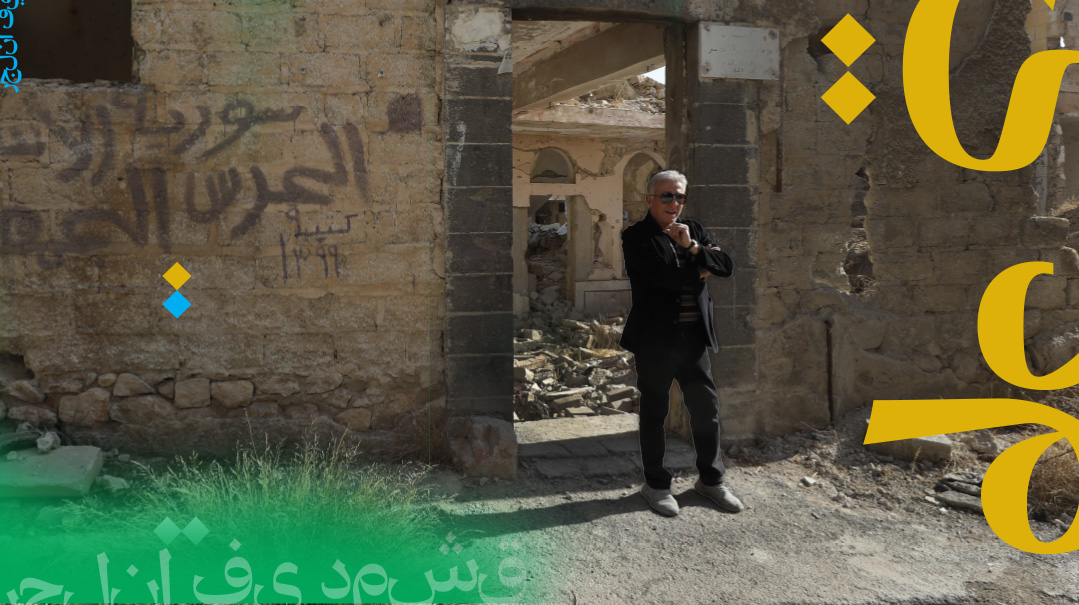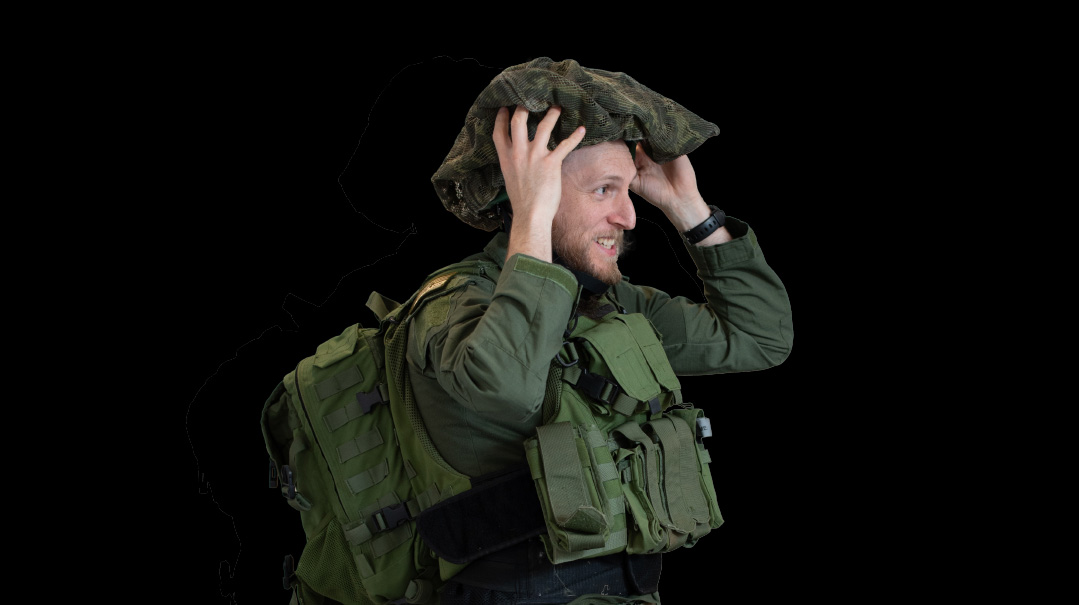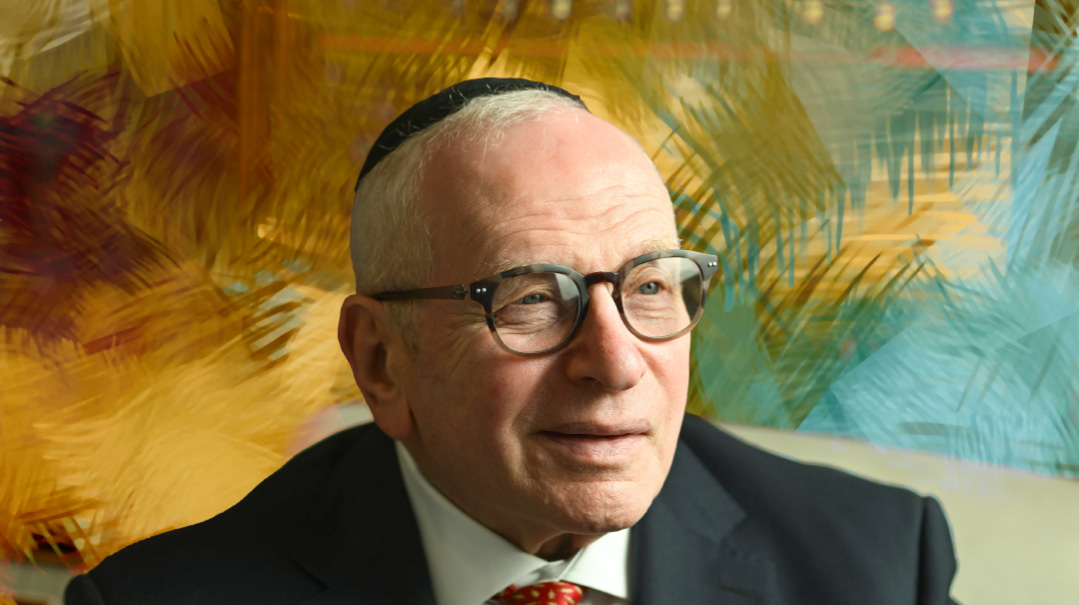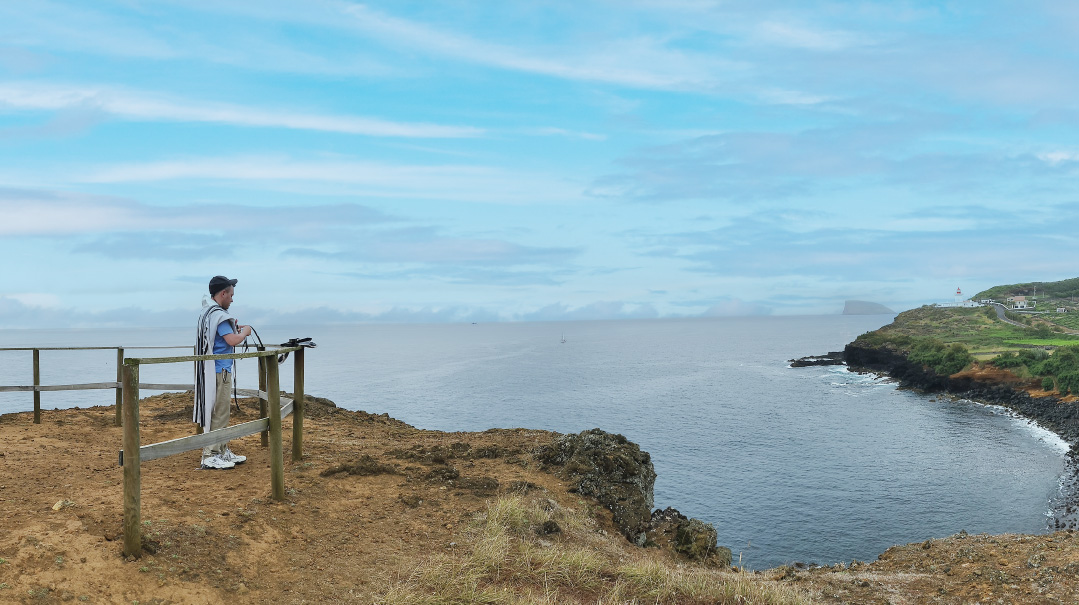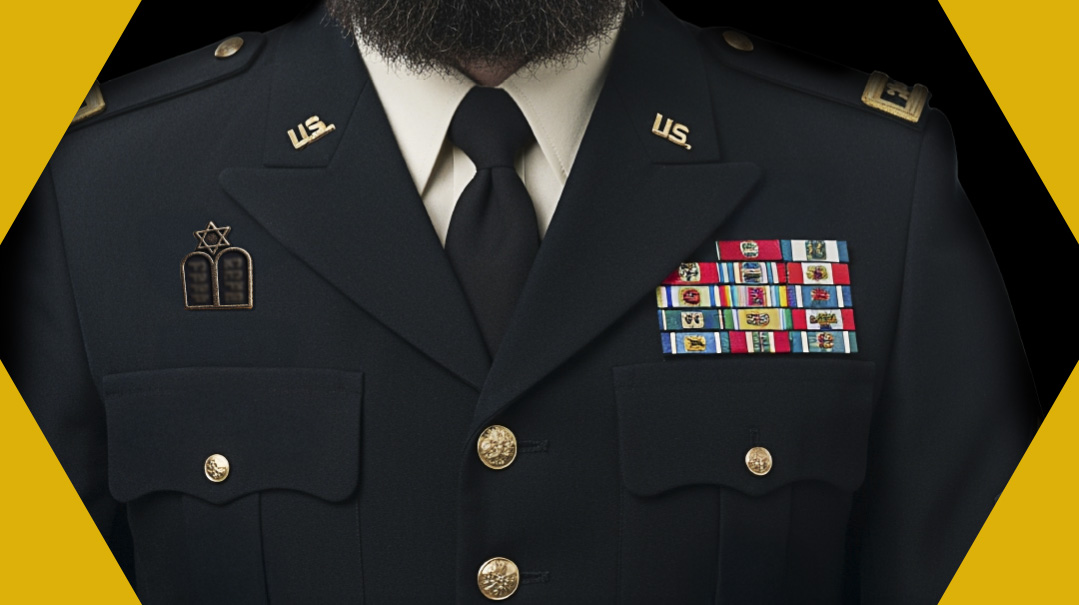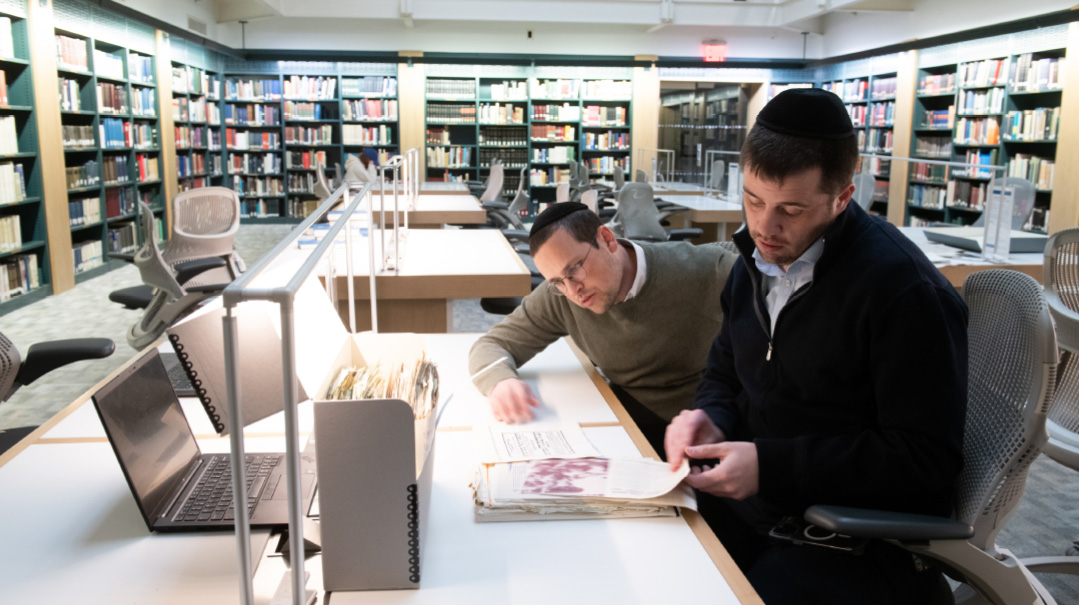All Roads Lead to Iran

Veteran Pentagon researcher Dr. Harold Rhode warns the West: A show of weakness is the route to disaster
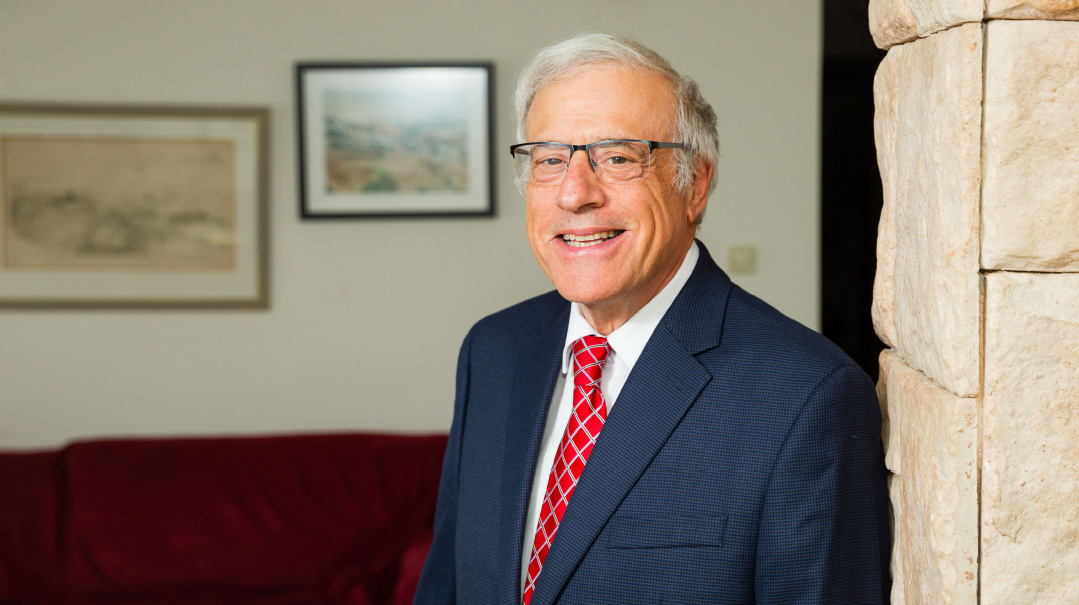
Photos: Elchanan Kotler
When news of Hamas’s deadly Simchas Torah attack filtered through to his Florida community, former Pentagon advisor Dr. Harold Rhode — a specialist on the Islamic world — was horrified, but not entirely surprised.
“For years I have been very worried about America growing closer to Iran, which has manifested itself in a relationship of American submission,” he told Mishpacha in a wide-ranging interview. “America has made huge concessions to Iran, which frankly are hard to understand. Just recently, the US transferred $6 billion to Iran, and it’s clear that the Iranians treated it as a weakness. And in the Middle East, when you perceive weakness, it’s an invitation to attack.”
With Israeli forces battling an Iranian terror proxy in Gaza, international shipping threatened by the Iran-funded Houthis, and American troops under attack by Iranian-backed forces across the Middle East, now is the time to connect the dots that lead back to Tehran.
And yet, says Harold Rhode, America seems intent on treating Gaza as a discrete problem, and forcing Israel to stop fighting before Iranian influence has taken a body blow.
“It’s clear to me that Iran is behind a very significant part of the October 7 attack,” he says. “The fact that Iran funds Hamas is well known, but I believe that Iran was very instrumental in organizing this attack as well. The Iranians, in contrast to Hamas, are excellent long-term planners. Iranians are chess players and rug makers. That means they have patience. They’re not just thinking of the move they’re making now — they’re thinking six moves down the road. What is a rug maker? He’s got patience. You can’t just make a rug — it’s slow and slow, one hooked thread at a time.”
Having lived and studied across the Middle East and wider Islamic world, Dr. Rhode sounds a warning bell about the lack of American understanding of the dynamic that has brought together Hamas and Iran, across the Sunni-Shi’ite divide, to attack Israel in what is essentially an attack on the United States as well.
“We have to understand that Muslims divide the world into Muslim believers and al kuffar, the Arabic term for people who are not Muslims, whom they fight against. From their point of view, the country that leads the world’s ‘non-Muslims’ is America, and in the Middle East it’s Israel.”
Dr. Rhode, who holds a PhD in Islamic history and who’s conducted research in Egypt, Syria, Jordan, Iran, Afghanistan, Turkey, Uzbekistan, and Kazakhstan, served as an advisor on Islamic culture for 28 years in the US Department of Defense, is now a distinguished senior fellow at the Gatestone Institute and a popular political writer.
He explains that the Iranian goal is to promote Shiite Islam throughout the world, and although Hamas is Sunni, the Iranians are ready to swallow this difference and fund Hamas with the hope that they will be able to strengthen their power against the wider US-led alliance.
(While most of the Muslim world is Sunni, Shi’ite Islam is the dominant sect in Iran and Iraq, a major difference being that Sunnis rely on the teachings of Muhammad to guide their actions while Shiites rely on their ayatollahs, whom they see as a sign of G-d on earth. Both groups, however, believe that once a territory is conquered and Islamicized, it must be ruled by Muslims forever. And that, of course, also includes the Land of Israel, ruled by Muslims before the Crusades. True, there can be temporary truces that may even last for centuries, but Muslims cannot recognize the right of Jews to permanently rule any part of the Holy Land.)
“That’s how the Arab mentality works,” says Rhode. “They work slowly, they’re in no hurry. Like a tiny termite that slowly eats away at a wooden house and eventually topples it — that’s how Iran works, in Israel and in America. The termite appears small at first, but the final goal is to topple the whole structure of the State of Israel.”
From his vantage point in far-away Florida, that wide-angle view of the Gaza war is one that Harold Rhode has developed since the Simchas Torah attack. It’s a worldview born of decades of travel and study in Iran, Iraq, Egypt, Jordan, Afghanistan, and among the Palestinians. Along the way, his encounters with the Muslim world’s fierce adherence to its beliefs prompted the Philadelphia native, who grew up religiously uncommitted, to examine his own Jewish roots, sparking a return to observance.
It also taught him something crucial about strength in the Middle East. In this region, the show of weakness the likes of which the White House seems intent on forcing on Israel is a road to disaster.
When Harold Rhode was 14, he spent six weeks in summer camp in Israel. It was really a great place, so why, he kept thinking, couldn’t Jews and Muslims live in harmony? He was just a teenager, but his mission was ignited: He would dedicate himself to the study of Islam in order to better understand the Israeli conflict.”
Sixty years later, he has decades of research of Arab nations behind him, including 28 years in the Pentagon as a senior advisor for Islamic culture affairs. While he still has no clear solution to an age-old conflict, one thing is unequivocal: “In Western society, we sometimes forget that in order to understand the enemy, we have to get into their brain. As long as we don’t know how to do that, as long as we believe they think like we do, we will never be able to understand what motivates them. It can create situations of brutal and absolute surprise, as we saw on October 7 in Israel.”
Dr. Rhode grew up in a working-class neighborhood in Philadelphia. “In the apartment across the hall from us lived a young couple with a little girl, immigrants from a different country,” he remembers. “At first, we kids — my three-year-old brother and five-year-old me — didn’t know where they came from, and only later did our parents tell us that they were from Israel.”
The Rhodes were Jewish, but uninterested and unaffiliated. There was no concept of holidays, kashrus, or any semblance of Jewish culture. “But when that family moved in,” Dr. Rhode says, “we forged a bond. They invited us to celebrate the Jewish holidays with them.”
A few years later, the family returned to Israel, but Harold felt a void — he missed celebrating Shabbos, Yom Tov, and Jewish events with his Israeli neighbors. And so, the summer after his bar mitzvah, his parents gave him the best gift he could have imagined — a summer in Israel, split between a kibbutz camp and visits with “his” Israeli family.
While that summer was a boost to his Jewish identity, tragedy hit soon after he returned home. His father, who he discovered later had been ill for some time, passed away, leaving the family emotionally and financially struggling.
For Harold, the fact that he loved school and was especially studious was a blessing. He threw himself into his studies, graduating high school at 16. He also taught himself several languages, including German (which was easy to pick up because he’d heard a lot of Yiddish at home from his parents’ Holocaust survivor friends). That enabled him to delve into family records and learn new details about his family’s background. He even flew to Lithuania to locate the graves of his great-grandparents (his parents were both American-born). After that, he spent three years traveling around the Middle East, returning to the US to begin college at Temple University in Philadelphia, so that he could be close to home and not leave his mother alone.
“After that,” he says, “I was accepted for a doctoral program at Columbia University, but I decided to hold off on my studies a bit. I was barely 20 years old at the time, and personally, I felt like I wanted to mature a bit before I continued on to a doctorate. So I was able to obtain a stipend that made it possible for me to tour Eastern Turkey, and I set out again.”
HE eventually did complete his doctorate at Columbia in Islamic history, specializing in the history of the Turks and Iranians. For Harold Rhode, the cracks in his idealistic plan to bring peace between Muslims and the West first began to appear in 1973, when he was 23 and studying Arabic and Islamic history at the American University of Cairo. His primary intention in enrolling in this program — some of its American professors were anti-Semitic — was to get to know Muslim society on a deeper level. He befriended many Muslim students at the university, communicating with them strictly in English. Although he was already fluent in Arabic (he also speaks Turkish, Persian, Hebrew, French, and some Spanish and Italian), he kept that a secret from his fellow students, so he could learn what was really on their minds when they talked to one another.
His newfound comrades graciously welcomed this Jewish kid from a predominantly black neighborhood in Philadelphia into their homes and mosques. Although they were friendly, Rhode began noticing something curious about the vast majority of Muslims he met. Whether educated or uneducated, they all appeared to be immune to empirical evidence; they also displayed disregard for thinking through ideas logically. As hard as he tried, he found himself utterly unable to dislodge them from believing in outright fantasies they held to be true, no matter what proofs he brought to the table. Objective truth fell by the wayside so they could preserve the delusion they concocted about the world.
“Westerners understand that there are different narratives about a given situation,” he says. “As long as people back themselves up empirically, we are willing to consider and respect their perspective. That’s not the case in the Middle East, where most people only accept one narrative, their own — everyone else’s narrative is wrong, regardless of objective reality. I soon realized that truth didn’t matter there and was easily discarded for the point they wanted to make. Good friends often looked me in the eyes while lying to me.
“In retrospect, despite the friendship they offered me, I don’t think that most Muslims ever trusted me. Most of them probably expected me to convert to Islam. Many couldn’t get their heads around the fact that I could be so knowledgeable about Islam, and yet not want to convert. For them, that was impossible.”
Later, at age 29, with his American PhD in hand, he set off to study at Ferdosi University in the Iranian city of Mashhad — and wound up being there in the early days of the Islamic Revolution, as the Shah was being deposed. Iran was to become an Islamic republic, controlled by a theocratic government under the authority of the Ayatollah.
During his time in Iran, Dr. Rhode, proud Jew that he is, also forged contacts with the Iranian Jewish communities, and met with Chacham Yedidya Shofet, the former chief rabbi of Iran.
“At one point, a friend and I made plans to travel to Afghanistan,” Dr. Rhode recalls. “Rabbi Shofet heard about it and sent three containers of meat to a Jew who lived on the Afghan-Tajikistan border. But once we entered the country, it became pretty clear that rule of law was mostly a recommendation. While there was little respect for law and order, the several dozen Jews who were still living there lived in fear. The only one who could move around freely was the man who was to receive our package — he was a regional doctor and was therefore accorded a level of respect.”
At the time, Dr. Rhode had a burning desire to find a way to make peace between the Muslims and the Jews.
“I spent my late teens traveling around the Muslim world, and I also cared passionately for Israel. I was desperately looking for a way for all of us to have peace, to let bygones be bygones,” he says. “But it wasn’t long before I learned that salam doesn’t actually mean peace, as we would wish. Salam means the joy a Muslim gets by submitting to All-ah’s will.
What Dr. Rhode learned then, and continued to see in his years studying Islamic law and culture, is that in Islam, peace as the West defines it cannot exist between Muslims and non-Muslims. However, according to both the Koran and the Sharia law, there can be a temporary agreement, some type of truce or armistice.
“Such a truce is called a sulha or hudna,” Dr. Rhode explans. “These agreements are modeled after a treaty between the Islamic prophet Muhammad and the Quraysh tribe of Mecca, whom Muhammad was unable to defeat. The agreement was to last ten years, but just two years later, when Mohammad had managed to rearm himself sufficiently, he reneged on the agreement, attacked his enemies, and defeated them.”
He says this sulha–hudna agreement is the type of non-aggression pact the Saudis and other Arab Muslim nations are willing to sign with Israel because they share a common enemy — Iran — but they are not long-term peace agreements, and will remain in force only as long as the leaders of these Arab countries believe them to be in their interest.
“I was in Iran in 1978, right before the Shah was deposed. I lived through the initial stages of the revolution, and I gained insight into the Iranian mindset. And I will tell you that it’s completely different from the way we think. And more than 40 years later, it’s essential that the people involved with them today understand it.
“The saddest thing is that the Western world simply refuses to understand this mindset. It’s as if I see a bottle that looks like water, and I’m really thirsty, and I know it’s not water, but a poisonous substance. You tell me, ‘Don’t touch it or you’ll die,’ but I refuse to listen to you because I’m thirsty. And that’s how it is with the US and our European allies. We are choosing not to know, choosing to ignore that if things continue as they are, Iran will soon have nuclear capability.”
Dr. Rhode points out that Iran is sitting on massive natural gas reserves, and in fact controls 20 percent of the world’s gas, so why does it need nuclear power for civilian use?
“You have to understand the totalitarian Iranian Muslim mindset,” Dr. Rhode explains. “Iran wants to take over, first the Middle East and then the entire world. Read its constitution — it’s based on the Koran. The idea is that we will all become Muslim. The biggest problem is that in Iran, unlike in the West, they have patience to wait it out, to up the ante, while we’re obsessed about our deadlines. But this is the Middle East, not Amazon Prime where you get same-day delivery.”
DR.Rhode returned to the US in 1979, taught Islamic history for three years at the University of Delaware, and then joined the Office of the Undersecretary of Defense for Policy at the Pentagon as an advisor on the Islamic world with a special emphasis on Turkey, Iran and Iraq, a position he held until 2010.
The leap from academia to the Pentagon came via the legendary historian of Islam and the Middle East, Dr. Bernard Lewis. At a meeting initiated by Rhode, Lewis — then 77 — was impressed by the scholarship of his far-younger visitor.
“What are you planning to do when you complete your doctorate?” Lewis asked, to which Rhode responded that he didn’t yet know. “If so,” Lewis said, “I have a position at an institute for higher education in Miami, where you can teach Eastern studies if you wish.”
Then in 1982, Lewis arranged for the ultimate promotion for his protégé: a job at the Reagan-era Pentagon as advisor on Islamic Cultural Affairs, which meant accompanying negotiating teams to explain the local mentality to American officials.
He also served for several years as the Turkish desk officer at the US Department of Defense, eventually taking his intimate knowledge of the Middle East to the Office of Net Assessment, an in-house think tank for the Pentagon
His familiarity with Turkey has led Dr. Rhode to explore the idea that the country could be part of the solution to the Gaza problem, by taking in large numbers of Sunni Gazans in a bid to balance a looming demographic crisis that the Turkey’s strongman leader, President Erdogan, is anxious to avoid.
Although Erdogan’s Sunni Islamic identity is most important to him, Dr. Rhode contends that he sees himself as very much an ethnic Turk as well. Turkey has a large Kurdish minority, and although they are also Sunni, they see themselves as ethnically Kurdish, not Turkish.
Erdogan has stated publicly that within 15 years, the Kurds, with their higher birth rate, will out-populate the Turks.
“How, Erdogan must be wondering, can Turkey stave off this impending ‘Kurdification’ and keep Turkey overwhelmingly Sunni Muslim and culturally Turkish? One answer,” says Dr. Rhode, “might be taking in Gaza refugees. Turkish Sunni culture is similar to that of the Sunni Arabs south of Turkey, including Syrians and Palestinians.”
Four million Syrian Arabs have already fled to Turkey to escape their country’s civil war, and Erdogan happily accepted them, understanding that they would offset the Kurdish demographic threat. In fact, he’s already done this with Arab Sunnis from Gaza, and has even given them state support.
“These immigrants have included mostly males between 15 and 35, and some have been from Judea and Samaria as well as Gaza,” he notes. “Women and their families have also immigrated.”
Although many Turks resent this immigration move because they’re prejudiced against Arabs, they can’t do much to stop Erdogan, who wields near-absolute power. Would large numbers of Gazans really move to Turkey if given the chance?
“Based on conversations I’ve had over the years with Arabs from Judea, Samaria, and Gaza, I believe that a great many would jump at the opportunity to start a new life elsewhere,” Dr. Rhode says. “They know they would be freer in countries like Turkey than they are under the tyrannical rule of Hamas and the Palestinian Authority. Moreover, given Turkey’s generous policies toward them, these Palestinians would certainly have a brighter future in Turkey than they have now.”
IN the ensuing years, as the Pentagon’s Middle East advisor for Islamic affairs, Dr. Rhode made many trips to Israel, still hoping to find some type of peaceful resolution between the Jews and the local Arab population.
That never did happen, but something else began to change.
“Throughout the years that I plumbed the Muslim world, I noticed how important religion is for them, and how it serves as a basic identity for them,” he says. “It made me connect more to the subject of faith, and I grew stronger in my own faith. I also felt that I wanted more tangible spirituality in my life, so I resolved to put on tefillin, and eventually my wife and I began to keep Shabbos.
“It might sound like something easy, but for someone like me, who was used to working 24/7, it seemed impossible. Whenever I heard about people who kept Shabbos, my response was, ‘It’s a waste of time.’ But when I began to keep Shabbos myself, I discovered that I was able to accomplish more in the six days of work than in seven. We also took on kashrus, which was more of a challenge for me because of my travels, but today, I can’t imagine myself living any differently — even though I admit I still know a lot more about sharia than I do about Talmud.”
His religious commitment rounds out the picture he knows to be true, after decades in the trenches, but Dr. Rhode says he can only sway those willing to listen.
“Many years ago, I gave a lecture at a kibbutz that I’d spent summers on, about how the Muslims in Judea and Samaria are talking among themselves about Israel,” he relates. “This was a leftist kibbutz, and at the end of the lecture, a woman came up to me and said, ‘You convinced me, but I will not accept what you’re saying. Because if I accept what you’re saying, I have to change my entire approach to understanding the Israel-Arab conflict, and I’m not willing to do that.’
“Unfortunately, these days I have a more willing audience.”
Saddam’s Basement Treasure Trove
Dr. Harold Rhode will never forget the euphoria he felt back in 2003 after finding thousands of waterlogged, moldy seforim, Gemaras, sifrei Torah, and other sacred texts and pieces of Judaica that belonged to Iraq’s once-vibrant Jewish community in the flooded basement of Saddam Hussein’s intelligence headquarters in Baghdad.
Dr. Rhode discovered the precious archive in the bombed-out building just a few days after he arrived in the Iraqi capital as a Pentagon official with the U.S. invasion force in the spring of 2003. For years, intelligence operatives working for Saddam Hussein and his predecessors apparently seized the scrolls and documents from shuls and private Jewish families, in periodic crackdowns or before the families would be allowed to emigrate.
After arranging for the transfer of the collection to be brought to the United States in metal shipping containers, on which he had scrawled “RHODE” and “TORAHS” in big letters, the books and documents were cleaned of mold and grime, preserved and digitally photographed by experts at the U.S. National Archives.
But that wasn’t the end of the story, because in 2013, the collection was to be returned to the Iraqi government. Dr. Rhode, who said the return would be like giving the personal effects of Jews killed in the Holocaust back to Germany, launched a campaign to halt the transfer. Earlier this year, an Iraqi delegation was still petitioning senior US State Department officials for the collection’s return to Iraq.
Dr. Rhode, who was one of the architects of the US-led invasion of Iraq from his desk at the Pentagon, learned of the Jewish archive from his friend and Iraqi opposition leader Ahmad Chalabi, who had ties with the Bush administration. Rhode took a team of US soldiers who were on a search for weapons of mass destruction, to help him search the headquarters. The WMD team descended down a flooded basement staircase where they found the Jewish treasures. Rhode then persuaded Chalabi to provide small pumps to drain the water from the basement and hurriedly got money from a Wall Street executive to pay Iraqis to carefully remove the papers and lay them in the sunlight to dry.
“I ordered a few locals to start bailing out the water. Then, with permission of rabbanim, we spread everything out on the ground, the sifrei Torha and the megillos, seforim and documents. We worked on it for six weeks, but I realized that in order to salvage the treasure. I’d need to find other ways,” Dr. Rhode relates.
Dr. Rhode’s efforts to get the Pentagon and the State Department to help salvage the documents were ignored until he enlisted the help of some of his former Pentagon bosses who contacted Defense Secretary Donald Rumsfeld, as well as his personal friend Natan Sharansky, the former Soviet dissident who was then an Israeli government minister. Sharansky asked Vice President Dick Cheney to help the project.
The next day, Dr. Rhode had all the help he needed, including several massive pumps and a refrigeration truck in which to keep the soaked documents frozen, a way of preserving them for eventual restoration.
Regarding the ongoing discussions about returning the treasure to the Iraqia, Dr. Rhode is adamant that “none of this treasure belongs to the state, but rather to the Jews from whom it was taken. This precious archive, containing seforim and manuscripts up to 500 years old, belongs to the Jewish people and no one else.”
After decades of service to the Pentagon, he says nothing in his career compares with this achievement. “It’s the most significant thing I’ve ever done,” he says, “I still don’t know why I was zocheh.”
(Originally featured in Mishpacha, Issue 991)
Oops! We could not locate your form.

